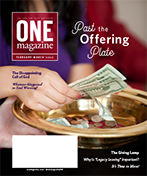
February -
March 2022
Stewardship: Past the Offering Plate
------------------
|





One pastor confronts the growing problem of gambling.
Don't Take the Gamble
By Corey Minter
Lately, nearly every ad I encounter on social media centers around gambling. I imagine it is because I fit the target demographic, but my friends who subscribe to cable tell me the assault has been going on for months. In fact, since the Supreme Court ruled prohibition of sports gambling inhibited states’ rights in 2018 (Murphy v. NCCAA), we all have encountered more than our fair share of betting propaganda.
During the short years since that landmark decision, sports betting has been legalized in 32 states, plus Washington, D.C. I cannot fathom the turmoil this has caused athletic organizations that endeavor to make all sporting competitions fair and unbiased.
The legalization has merely brought to light activities already practiced in the dark. Before the Supreme Court ruling, Americans illegally chanced $150 billion on athletic competitions. Now, the legalized industry flaunts annual gains of $165 billion, not including those who continue to gamble illegally.
This article is not about the undeniable corruption our favorite leagues face, nor is it a political tirade against a legal decision. While I find those aspects of the issue worrisome, my primary concern is the normalizing of a harmful habit. If viewed often enough, or if the commercial is entertaining enough, I think we all run the risk of being desensitized to a vice hawked as harmless.
The whole industry is passed off as innocent entertainment—just another friendly way to enjoy the games we all love. However, as is the case with all advertising, the glitzy ads don’t show the beastly underbelly. Marital strain, reverse mortgages, hungry children, and delinquent bills never make the 30-second commercial cut. I foresee a series of “make-up” ads in future decades like those produced by big tobacco. Why? Because gambling is harmful.
Let’s be clear. Out-of-control gambling is a clinically recognized behavioral addiction. It has strained many relationships and strangled more. I will never forget when, as a new pastor, a gentleman approached me after a service, completely broken because he had lost so much of his hard-earned money on online poker. He was devastated. But more than that, he was confused, confessing “I don’t know where it all went.”
He fell prey to common ploys casinos have implemented for the last century. Distance people from their money by exchanging cash for chips, so they do not see the stack of bills depleting. Front players some chips at the outset to prime the pump. Let them feel they could win it all back with one hand, maybe at a lower buy-in. Foster a disingenuous relationship with them through congenial dealers.
Online sports gambling does many of the same things. The online interface additionally makes it a faceless threat, often indulged without trusted friends and family members to hold you accountable. Even when practiced within a community of peers (think fantasy leagues), it is more than likely accompanied by a hefty dose of “friendly” goading to risk a little more.
The sports gambling industry plays on the unhealthy emotional attachment many have with their favorite teams and players. Perhaps you have heard ads do this by calling users “ultimate” fans. The implication? You are not truly a fan unless you are willing to “put some skin in the game.”
Take a moment for a quick Internet search for “sports gambling,” and you will find dozens of articles from reputable sources offering both empirical and anecdotal data demonstrating this vice has not been good for society. Throw a global pandemic into the mix when people were encouraged (or required) to stay home and often glued to their screens, and the result is disastrous. One state with recently legalized online sports gambling registered a 10% uptick in calls to its gambling helpline within a single year of legalization.
The problem is real, and as with every aspect of life, children of God ought to view gambling through the lens and filter of God’s Word. Although the Bible may not outright condemn gambling as a sin by name, many passages warn the wise against it. “Thou shall not covet” (Exodus 20:17a) and “The love of money is the root of all evil” (1 Timothy 6:10a) are go-to verses that speak in generic terms to our relationship with money. And, honestly, they should be applied to every side-hustle we chase.
But Proverbs 13:11 gets right to the core issue of gambling. In his writings to the wise, Solomon told readers fast money disappears quickly (here today, gone tomorrow), and wealth is best built steadily, over time. In this proverb, God’s wisest man defined both the allures and dangers of gambling. The attraction is obvious: obtaining money quickly without having to work for it. This sounds like the best thing ever. But Solomon warns against this type of windfall. His warning is valid, considering how quickly lottery winners blow through their winnings. For instance: one study of Florida winners revealed 70% spent every dime of their newfound fortune within five years.
However, the greatest danger in getting rich quickly, whether through risky stock market speculation, the latest financial trends, or online sports gaming is that it diminishes the merit of a hard day’s work. Work is good. It was ordained by God before humanity’s fall. Through it, we learn the value of planning for the future and the blessings of generosity. The consistent “clocking in” to work diligently until day’s end reminds the believer work remains to be done for the Kingdom until Christ calls us home. Careful management of work and finances is a key element to a life of stewardship.
Gambling and other risky financial ventures fly in the face of the simple life to which Christ called His Church in the book of Acts, when the early church gathered daily in the temple, enjoyed meals from house to house with gladness, simplicity, and praise. These simple, heartfelt actions won the favor of the community, and God added to the church exponentially (Acts 2:46-47).
If I am in the advertising crosshairs of the gambling monoliths (and I do mean crosshairs), I am sure others my age and younger, who are still seeking to establish themselves, are seeing the same ads.
Don’t take the gamble! Don’t fall prey to the seeming innocence of gambling or become desensitized to its perils and pitfalls through engaging advertising. Instead, live by the words of the author of Hebrews. “Let your conversation be without covetousness; and be content with such things as ye have: for he hath said, I will never leave thee, nor forsake thee” (Hebrews 13:5).
Recall the words of Christ Himself that have impacted our finances for the two millennia since He spoke them: “For where your treasure is, there will your heart be also” (Matthew 6:21).
About the Author: Corey Minter, a graduate of Gateway Christian College, has been lead pastor of New Hope FWB Church since early 2014. Corey met his wife Rachel at the church they attended in their hometown of Virginia Beach. They have two daughters, Claire and Naomi. In his spare time, Corey enjoys hiking, kayaking, and trying new local restaurants with his family.
|
|

